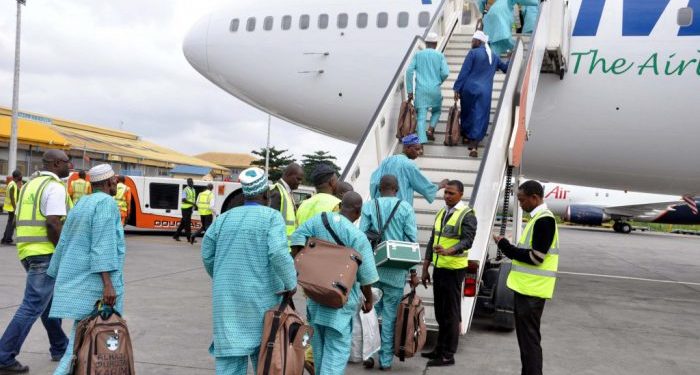News
Saudi Arabia cuts Nigeria’s 2026 Hajj camp quota

The National Hajj Commission of Nigeria (NAHCON) has expressed concern over a sharp reduction in camp accommodation slots for Nigerian pilgrims by Saudi authorities ahead of the 2026 Hajj, warning that the move could significantly affect participation next year.
This was revealed in a statement titled “NAHCON, States Discuss Hajj Costing and Other Critical Issues; Ministry Briefs NAHCON on Tour Operators,” and signed on Thursday by the Commission’s Deputy Director of Information and Public Relations, Fatima Usara.
According to the Commission, although Nigeria received an allocation of 95,000 slots for the 2026 Hajj, only 66,910 have been approved on Saudi Arabia’s NUSUK Masar portal for camp accommodation — a shortfall that may pose serious challenges for states and licensed tour operators.
The statement read, “the Mashair space reserved for Nigeria’s pilgrims on the NUSUK Masar portal is actually 66,910 slots for the 2026 Hajj. The implication of this is that while 95,000 slots were allocated to Nigeria, the actual number that can participate in the 2026 Hajj is 51,513 for States and all other officials, while 15,397 will go to licensed Tour Operators.”
NAHCON explained that the cut was introduced as a penalty for Nigeria’s failure to fully utilise its allocation during the 2025 Hajj.
Records show that although the Commission had secured 52,544 spaces for state pilgrims in 2025, only 41,218 were eventually airlifted under the government quota. An additional 18,000 pilgrims travelled through private tour operators, bringing the total to 59,128 — leaving 35,872 unused from the 95,000 slots offered by the Saudi Ministry of Hajj and Umrah.
During a meeting with State Pilgrims Welfare Boards on Thursday, NAHCON’s Commissioner of Operations, Prince Anofiu Elegushi, said, “earlier allocations will be reversed based on each State’s utilisation during the 2025 Hajj as well.”
He cautioned that states that failed to fill their quotas last year would bear the brunt of the new reduction.
The Commission added that during a virtual meeting with the Saudi Ministry of Hajj and Umrah, it was directed to “allocate a minimum of 2,000 Hajj slots to each group of Tour Operators” and ensure registration on the NUSUK platform.
NAHCON Chairman, Professor Abdullahi Usman, urged cooperation among stakeholders to prevent disruptions in next year’s exercise, stressing that “unity in this assignment” was vital for a successful Hajj 2026.
He also appealed to State Executive Secretaries to take medical screening seriously “due to the seriousness that Saudi Arabia attaches to it.”
With forex volatility raising concerns about rising pilgrimage costs, NAHCON said discussions were ongoing “to negotiate reductions in certain cost components such as cargo handling charges, in order to ease the financial burden on intending pilgrims.”
However, it warned that service providers’ rates “will not be arbitrarily reduced,” as that could affect the quality of services to pilgrims.
Dr. Adetona Adedeji, the Central Bank of Nigeria’s representative on NAHCON’s board, pledged to help relay the Commission’s request for a review of the 2% charge imposed on pilgrims’ transactions.
The meeting also agreed that funds from states should be remitted to the CBN as they are received, to take advantage of favourable exchange rates.
NAHCON reminded state officials of the December 21 deadline for remittances and urged them to set earlier internal cut-off dates to ensure timely transfers. It also announced plans for nationwide sensitisation campaigns “to highlight the urgency and importance of meeting the deadline.”
The Commission further confirmed that the 2026 Hajj will adopt the international aviation luggage policy, permitting “each pilgrim two 23kg checked-in bags and one backpack as hand luggage.”
It also restated Saudi Arabia’s strict medical entry rules, noting that “individuals with organ failure, neurological or psychiatric disorders, dementia, pregnancy, active cancer undergoing chemotherapy, tuberculosis, or other communicable diseases will not be allowed entry into the Kingdom.”






















